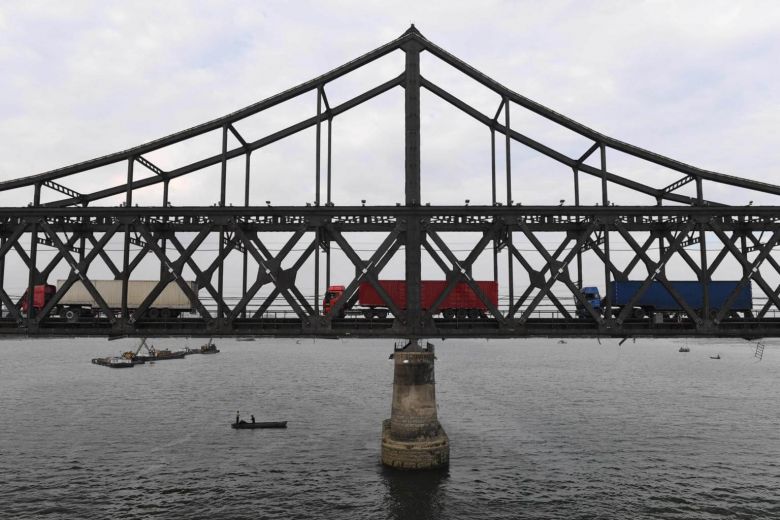Media Report

- Fortune reports: "The United States on Tuesday imposed sanctions against 13 Chinese and North Korean organizations Washington accused of helping evade nuclear restrictions against Pyongyang and supporting the country through trade of commodities like coal. The U.S. Treasury announced the action one day after President Donald Trump put North Korea back on a list of state sponsors of terrorism, on its website. The new curbs show the Trump administration's focus on hurting trade between China and North Korea, which it sees as key to deterring Pyongyang from its ambition to develop a nuclear-tipped missile capable of hitting the United States. 'This designation will impose further sanctions and penalties on North Korea and related persons, and supports our maximum pressure campaign to isolate the murderous regime,' said Treasury Secretary Steven T. Mnuchin. The latest sanctions included blacklisting three Chinese companies, Dandong Kehua Economy & Trade Co., Dandong Xianghe Trading Co., and Dandong Hongda Trade Co., which the Treasury Department said had done more than $750 million in combined trade with North Korea over almost five years until Aug. 31."
- TIME reports: "China's former top internet regulator and censor is being investigated by the ruling Communist Party's anti-corruption arm, the agency said Tuesday. The party's anti-graft watchdog agency said in a brief statement on its website that Lu Wei is suspected of 'serious violations of discipline.' Until Tuesday's announcement, Lu had been deputy head of the party's propaganda department. Lu was known as a hard-liner responsible for leading the government's efforts to tighten control over domestic cyberspace and championing the party's position that governments have a right to filter and censor their countries' internet. He wielded enormous power over what 700 million Chinese internet users could view online and acted as gatekeeper for technology companies wishing to do business in China. No details were given in Tuesday's announcement, which comes after a party congress at which President Xi Jinping was given a second five-year term as party chief. Lu is the most senior Chinese official to be investigated since the party congress closed late last month."
- The Hill comments: "The headline alone is terrifying: "Surveillance cameras made by China are hanging all over the U.S." Scarier still, it's true — the Chinese government owns a 42 percent stake in Hikvision, one of the world's largest manufacturers of cameras and other video surveillance equipment. Its products are used at public sites and private companies around the world, including multiple U.S. government facilities. It's easy to extrapolate some bleak scenarios based on this information: could the Chinese government be building 'back doors' into Hikvision systems to facilitate state-sponsored snooping on sensitive American sites? The company vigorously denies this possibility, though it brings up echoes of 2012 when Chinese tech firms Huawei and ZTE landed in hot water for potentially threatening U.S. national security. But while cyberespionage will always grab headlines, there's a quieter, more pervasive security threat at play here. China is still the engine behind global tech hardware manufacturing, an industry which continues to boom as internet-connected devices become an increasingly common part of our daily lives. The so-called 'internet of things' is growing exponentially, including everything from the surveillance cameras Hikvision makes to your fitness tracker or smart thermostat... Simply put, we're all going to be using Chinese technology and devices as a critical component of our connected lives moving forward. How consumers, companies, and governments effectively manage that reality will have widespread implications for digital security and privacy protection."
Calendar
- 2017-11-21 China and the United States Are Equals. Now What?
- 2017-11-20 U.S. Rebuffs China’s Charm Offensive, Edging Closer to Trade War
- 2017-11-19 Beyond Trump-Xi Bond, White House Looks to Toughen China Policy
- 2017-11-17 Is it time for U.S. concessions to defuse North Korea crisis? China says yes.
- 2017-11-16 Why the West Should Take China's Belt and Road Initiative Seriously
- 2017-11-15 China Will Send Envoy to North Korea, Likely to Urge Nuclear Talks
- 2017-11-14 Susan Rice: Trump Is Making China Great Again
- 2017-11-13 Trump has a long way to go on the road to fixing US-China trade
- 2017-11-12 After Trump's Bonhomie in Beijing, a Trade Face-Off Brews
- 2017-11-10 China's Xi preaches 'openness' and 'cooperation' after Trump comes out swinging
News
- Fortune U.S. Sanctions 13 Chinese and North Korean Organizations
- TIME China Is Investigating its Former Internet Censor-in-Chief for Corruption
- BBC News Two Boeing 747 jumbo jets sold in China Taobao auction
- CNBC China is pumping a lot of cash into its economy to calm investors
- The New York Times U.S. Bribery Case Sheds Light on Mysterious Chinese Company
- CNBC China clamps down on online micro lending; US-listed shares plunge
- TIME President Trump Has Imposed New Sanctions on North Korea and Chinese Trading Firms
- Financial Times Chinese foreign property investment at 4-year low amid clampdown
- The Guardian China turns its back on Comrade Bob to embrace change in Zimbabwe
- Quartz China's box office is setting new records—with a bit of Hollywood help
- The Guardian China and Vatican turn to 'diplomacy of art' as rapprochement stalls
- Fortune China's Sizzling Healthcare Startups
Commentary
- The Hill China's insidious surveillance army: The internet of things
- Bloomberg China Isn't Winning the Race for Space
- Financial Times Donald Trump's unwitting surrender to China
- ChinaFile An Ocean Voyage Brings Queer Chinese Couples a Step Closer to Home
- ChinaFile A New Generation Looks at the China-Africa Relationship
- Bloomberg Victoria's Secret Meets China's Security
- Financial Times Beijing throws cold water on China's fintech IPO wave
